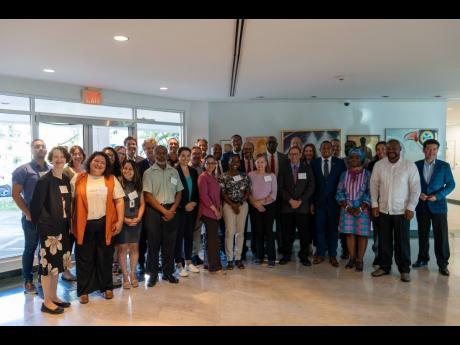Barbados hosts largest-ever meeting of FAO fishery body
Pressing issues threatening the sustainability of living marine resources across the Caribbean were discussed at the 19th Session of the Western Central Atlantic Fishery Commission (WECAFC) held in Bridgetown, Barbados, earlier this month.
The hybrid meeting, which was organised and led by the Food and Agriculture Organization of the United Nations (FAO), was attended by 110 delegates from 22 member countries and 11 partner organisations, signalling the highest number of delegates to ever attend in the history of this commission’s plenary meetings.
The delegates of the 19th session discussed the interim Caribbean Regional Management Plan for the Anchored Fish Aggregating Device Fishery (aFAD), and the associated guide for improved monitoring aFAD catches and assessment of aFAD impacts on stocks. They also reviewed the manual on aFAD Fisheries Governance with application to other Fisheries in the Wider Caribbean and the impacts of sargassum on marine resources in the region, a regional socio-economic and environmental developing issue.
The progress made in the strategic reorientation of the commission, the finalisation of the revised 2014 Rules of Procedures, opportunities for collaboration with the International Commission for the Conservation of Atlantic Tunas (ICCAT), and other critical topics of potential implications for the fisheries in the region, among others two global instruments, the Marine Biodiversity of Areas Beyond National Jurisdiction (BBNJ) treaty, and the World Trade Organization (WTO) Agreement on Fisheries Subsidies, were included on the comprehensive agenda for discourse.
In delivering opening remarks, Adrian Forde, Barbados’ minister of environment and national beautification, the green and blue economy, spoke on the significance of the meeting for Barbados and at large, the CARICOM countries, and acknowledged the considerable progress of WECAFC in the preparation of fisheries management advice, especially as it relates to the management of fisheries using anchored Fish Aggregating Devices (aFADs).
He outlined that Barbados had begun the process of adapting the guidance from the Caribbean Regional Management Plan for aFADs to their local context. He informed that the draft FAD regulations that are subsidiary to the Sustainable Fisheries Management and Development Suite of Laws were approved by Cabinet on 18 May 2023. The regulations once finalised will be the impetus for the development of a formal FAD management plan.
He also expressed his hope that Barbados’ participation during the session would support a continuity of purpose, lend to the implementation of tabled initiatives, and redound to more responsible fisheries management across WECAFC member states.
Dr Renata Clarke, FAO’s Sub-regional Coordinator in delivering remarks on behalf of the organisation, underscored the importance of matters such as the strategic reorientation of the Commission, a process recurrently underscored by the FAO Committee on Fisheries (COFI) - the most important international forum for policy debate and the adoption of policy instruments in the fisheries and aquaculture sector. She stressed that this would allow the region to keep pace with the 2030 development agenda and ultimately, meet the goal of a aworld without hunger and malnutrition, which is at the core of the mandate of FAO.
Clarke added, “We speak of the Blue Economy, of the needed Blue Transformation, of the ambition of us in the Caribbean to truly position ourselves as truly as the Big Ocean States. The work of WECAFC is a necessary foundation for realizing our ambitions.”
During the 19th WECAFC session, Floyd Green, Jamaica’s minister of agriculture, fisheries, and mining, was elected as the new chair of WECAFC.
“Jamaica is honoured to be elected chair of WECAFC. WECAFC continues to be essential in our collective mission for sustainable fisheries, especially at this time when the world seeks to strengthen fisheries management. We are looking forward to continuing and expanding the attention paid by the organisation to our artisanal fishers and we seek to provide greater scientific and technical support to ensure they have sustainable livelihoods,” said Green.
“The continued reorientation of WECAFC and the active engagement of our members will be key priorities as we craft a legacy of action that will create better production, better nutrition, a better environment, and ultimately a better life.”

